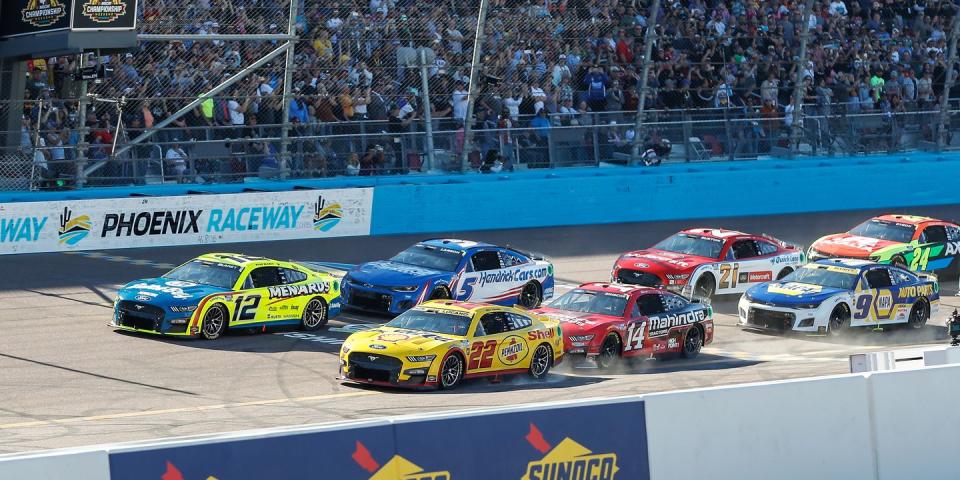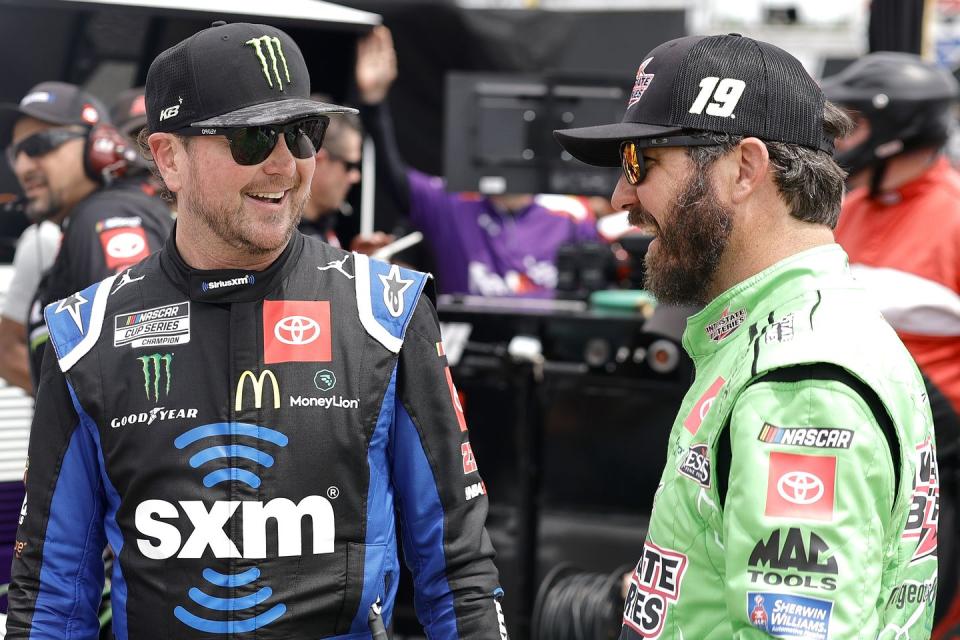NASCAR State of the Sport: Other Cities Looking to Follow Chicago, Host Cup Races

As with all entertainment enterprises, NASCAR and its member-tracks are fighting to get its share of discretionary spending.
NASCAR’s positive changes during the 2020 and 2021 seasons included new ownership from celebrities Michael Jordan and Pitbull, increased interest from minorities both within and outside the sport, better TV ratings.
Next summer’s street race in downtown Chicago has led to interest from other cities.
Last weekend’s annual State of the Sport message from NASCAR president Steve Phelps shed almost nothing new of startling interest, similar to almost every other corporate end-of-year address.
Overall, for the most part, everything in Daytona Beach and Charlotte is going well, save for a few concerns about safety surrounding the year-old Next Gen car.
Phelps acknowledged the sanctioning body had been somewhat shaky when last he addressed his constituency two years ago at Homestead-Miami Speedway. The 2019 season had been a good one and the early portions of 2020 also looked promising. But the sport was deeply impacted when COVID-19 became a national issue that spring.
The pandemic deeply impacted almost everything NASCAR-related: the Cup, Xfinity, and Camping World schedules, attendance, television ratings, sponsorship interest, and potential newcomers to the sport. “There weren’t a lot of bright spots,” he said on Championship Weekend at Phoenix Raceway. “That was a very scary time, those 71 days (between when NASCAR shut down in March until it reopened in May).
“I stood in front of you (after that 2020 season) and talked about our best days being in front of us. I know that seemed kind of foolish and maybe some of you were snickering, like, ‘I’m not sure that’s going to happen.’ But where we sit here today, I think that’s exactly what’s happened.”
Phelps briefly recapped NASCAR’s positive changes during the 2020 and 2021 seasons: new ownership from celebrities Michael Jordan and Pitbull, increased interest from minorities both within and outside the sport, better TV ratings, a more favorable public perception regarding civic and social concerns, and on-track success from minority drivers Bubba Wallace and Daniel Suarez.

“All of that is important,” Phelps said. “It’s changing the face of the sport as we move forward. And you can do that without taking away from what’s happening with your existing fans who have been here for 30, 40, 50, 60 years. They want great racing. They want storylines. They want their drivers to win. They want us to serve them content that’s interesting, unique and special. That’s what we’ve done while we’ve been able to serve this new fan.”
As for the just-completed 2022 season:
“The Next Gen car and its introduction were so important,” Phelps said. “Before this year, you had to have a relationship with one of five teams (Hendrick, Childress, Penske, Gibbs, Stewart-Haas) if you wanted to come into this sport. This car changed that and resulted in 19 different winners, more than half the field. The racing has delivered; it’s been terrific.”
Among the other points presented by Phelps and chief operating officer Steve O’Donnell:
• Next summer’s street race in downtown Chicago has led to interest from other cities. “Their phones (O’Donnell and NASCAR vice president Ben Kennedy) are ringing from cities saying, ‘We’d love to host a NASCAR race,’” Phelps said. “And we have calls coming from north and south of the border. Whether that happens in 2024 or not, I don't know. What I do know is we’re going to have continued schedule variation in 2024. (Chicago) will look nothing like any NASCAR race we’ve ever had.”

• NASCAR is determined to improve its communications with teams, something both sides agree needs work. The new Driver Advisory Council includes retired drivers Jeff Burton, Kyle Petty, and Dale Jarrett, along with active drivers Joey Logano, Kyle Busch, and Denny Hamlin. The group met with NASCAR officials during the season to discuss Next Gen safety concerns.
But early in the fall, when communication lagged between the DAC and drivers at large, NASCAR began scheduling weekly meetings. “Communication between us and drivers over this past five or six weeks has shifted the narrative on how they are feeling about safety or raceability,” O’Donnell said. “You can tell there’s a difference in the conversations we’re having. Until the drivers feel we’re over-communicating, we’re going to continue to have those meetings.”

• The most frequent criticism of the Next Gen car concerns its rigid rear clip. After Kurt Busch and Alex Bowman suffered serious concussions in rear-first crashes, drivers went to NASCAR and asked that engineers study that area of the car.
O’Donnell defended NASCAR’s reaction to William Byron’s preseason testing crash, saying the organization changed the rear clip and made other safety adjustments. “As with anything new, you’re going to learn and collect data,” he said. “Adjustments have been made to the rear clip; they’ve already gone out to the race teams for next year. The dialogue with race teams about how we continued to protect from the catastrophic is the number one priority.
“And it’s not just the car. The dialogue we’ve had with the teams involves how are you fitting in your seat, helmets, foam head surround. All those things are part of this dialogue, which is really, really good. We’re seeing some improvements on a daily basis as we look towards 2023.”
• As with all entertainment enterprises, NASCAR and its member-tracks are fighting to get its share of discretionary spending. Phelps expressed concern about fans—especially families with children—getting their money’s worth on a race weekend.

“It’s a good question, one we’ve been concerned about, one we’ve been monitoring significantly,” he said. “We have a group of folks selling tickets, and they are able to have real-time dialogue with fans to try to understand the difficulties we’ve had. I’m surprised at the type of consumer numbers we’ve seen. Our numbers are up over 20 percent, despite what was happening with gas prices or the very true inflationary things that are happening.
“We haven’t seen a decline in ticket sales; we’ve actually seen the opposite. Frankly, I don’t understand it; it’s a bit puzzling. We are one of the only sports that by and large have held ticket prices flat over the last four or five years. We want to make sure the grandstands are packed. We’ve had nine sellouts this year; last year we had five. We’ll be double-digits next year. We want to be a place for our race fans to get a good value for their buck.”
• Among other comments from O’Donnell: “We like having guys that are brash and different and bold, that are creating their own fan bases. Ross Chastain has a terrific personality and backs it up on the track and his unapologetic about it. I think star power is critical, so we’re going to embrace star power (and) put an accelerant on it because that will help the sport grow.
“There’s no fresh news (about a fourth manufacturer entering the sport) other than there is ongoing dialogue. This is a really complicated time in the auto industry in general, so we’re balancing that in terms of what is the sport going to look like three, four, five years from now?
• From Phelps: Our relationship with FOX and NBC has never been better, ever. It’s at a level we haven’t seen from a television perspective since the early 2000s when this whole new model came to be. That’s done through a lot of hard work. It’s done because the sport, its ratings have stabilized and grown. I’m not sure where the future’s going to be with respect to our media partners, but I do know it will go through NBC and FOX.
• Finally…. a few words from Phelps about Ross Chastain’s last-lap move at Martinsville 10 days ago:
“It was something unique and different that hadn’t been done before, certainly not executed (successfully). I think there are others who have tried it. But he not only tried it, he made it work. If you look at social media numbers, there have been over 100 million views of what happened.
“I’m sure Ross has a lot of new fans for what he did. It’s going to be something that will go down in history. I’m sure Winston (Kelley, of the NASCAR Hall of Fame) is looking at that, figuring out if there’s an exhibit or loop that’s going to happen around what that is because it was historic."

 Yahoo Autos
Yahoo Autos 